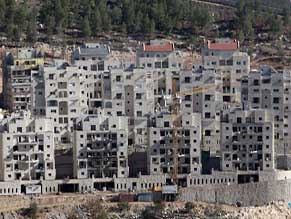|
World Jewish News

Har Homa, East Jerusalem (photo by telegraph.co.uk)
|
Israel planning 50,000 housing units in East Jerusalem
11.03.2010, Israel Some 50,000 new housing units in Jerusalem neighborhoods beyond the Green Line are in various stages of planning and approval, planning officials told Haaretz. They said Jerusalem's construction plans for the next few years, even decades, are expected to focus on East Jerusalem.
Most of the housing units will be built in predominantly Jewish neighborhoods beyond the Green Line, while a smaller number of them will be built in Arab neighborhoods. The plans for some 20,000 of the apartments are already in advanced stages of approval and implementation, while plans for the remainder have yet to be submitted to the planning committees.
The planned construction includes the 1,600 homes in the ultra-Orthodox East Jerusalem neighborhood of Ramat Shlomo that were approved Tuesday. Saying the decision undermines peace talks, U.S. Vice President Joe Biden has publicly condemned the move, which the Interior Ministry announced during his visit to Israel.
Ministry officials said the announcement was not intended to coincide with Biden's visit.
If the East Jerusalem construction plans are implemented, they will make it impossible to resolve the Israeli-Palestinian conflict, said an activist of the left-wing Ir Amim non-governmental organization.
"The first, most explosive 'circle of construction' in East Jerusalem is in the Old City," said Orly Noy of Ir Amim, which says it seeks to promote Israeli-Palestinian relations in Jerusalem. "The second circle is the ideological settlements being built in the heart of Palestinian neighborhoods in the historic basin, and the third is expanding the existing neighborhoods in the east of the city."
Taken together, the East Jerusalem construction "will move Israel beyond the point of no return, as far as an agreed solution to the Israeli-Palestinian conflict is concerned," she said.
Municipal planning officials said the only direction in which Jerusalem can grow is eastward. The municipality ruled out westward development after the controversial Safdie Plan - a massive construction project planned for the hills west of the capital - was axed three years ago under pressure from environmental groups.
Massive construction within Jerusalem's older neighborhoods was also scrapped, since it clashed with other considerations: keeping buildings low, preserving historic buildings and streets, and retaining quality of life.
Ir Amim data show that the construction plans in advanced stages of approval are for Gilo (3,000 housing units), Har Homa (1,500), Pisgat Ze'ev (1,500), Givat Hamatos (3,500), Ramot (1,200), Armon Hanetziv (600) and Neveh Yaakov (450).
Several construction plans are not being advanced at the moment, including a plan to build 1,300 housing units in a neighborhood in the south of the city. In addition, a plan to make Atarot an ultra-Orthodox neighborhood was put on hold after Mayor Nir Barkat decided to revitalize the industrial area there.
The state - in the form of the Israel Lands Administration and the Housing and Construction Ministry - is the main force behind these projects. Private businesses and political organizations - including settlers groups, which are building in the midst of Palestinian neighborhoods - are also advancing the projects.
The settlers groups are advancing plans to expand the Ma'aleh Zeitim settlement in Ras al Amud from 60 housing units to more than 200.
The housing shortage in Jerusalem has become more acute in recent years, especially in ultra-Orthodox areas, pushing thousands of ultra-Orthodox families a year to the Haredi cities Betar Ilit and Modi'in Ilit, in the West Bank. The West Bank construction freeze has increased the pressure to create more housing in Jerusalem.
Haaretz.com
|
|
